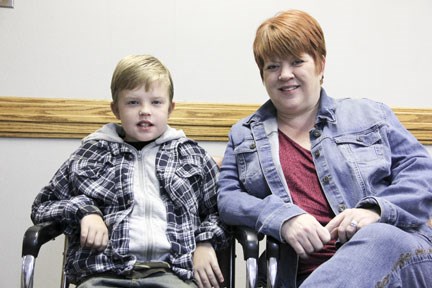Everybody wants to be understood, even kids who might be a little difficult to understand.
Estevan's Chris Luskey and Jeanette Golder have had to learn to understand their son Gage since the day he was born. Gage was born with Niemann-Pick Disease, a genetic metabolic storage disorder. It's an extremely rare and ultimately terminal illness more simply described as childhood Alzheimer's.
The 10-year-old suffers from type C, and his mother Jeanette believes he is the only one in Saskatchewan with the disease. There are only 10 type-C cases in Canada and about 500 worldwide.
Gage was born in St. Albert, Alta., and it was clear from the start that there was something different about him. He was immediately sent to the Stollery Children's Hospital in Edmonton following his birth, but it would take six months before the Niemann-Pick diagnosis was made. In those first few months, many tests were done on Gage such as bone marrow, liver and skin biopsies that were sent to the Mayo Clinic.
As Golder said, it's incredibly rare and many medical professionals just don't have any experience with the disease.
"We were fortunate, actually, to get a diagnosis as young as he was, because a lot of parents spend years as most doctors have not heard of it."
Niemann-Pick is passed down to children only when their parents are both carriers.
"We hit the lotto, basically. The chances of two carriers, and it's unbeknownst to you that you're a carrier, that meet and have a child. There's no testing for it. There's no prenatal testing or anything like that," she said.
Gage attends the Grade 5 class at Pleasantdale School where he has been learning since kindergarten. His mother said he is in the best condition he has ever been in.
Golder said those who meet Gage may notice that he appears a little clumsy, struggling with some of the finer motor skills, or that he has trouble with his memory. Hearing about his struggles to remember, Gage, sitting next to his mother, pipes up, "Nine times nine is 81." He remembers that one.
His speech has come a long way, and he no longer sees a speech therapist.
This October is the 12th annual National Niemann-Pick Disease Awareness Month, and Golder said it's a great time for everyone to learn a little about Gage and inspire some understanding about what his life is like.
Gage has an enlarged liver and spleen, which creates a number of physical limitations, and he struggles with memory and emotional control at times.
"It makes it a little difficult at school," said Golder. "(The other students) understand Gage has limitations, but they don't really understand why."
She said for his classmates, it's a lot for them to understand because as kids they have so many of their own things to deal with.
Sports are mostly out of the picture for Gage, but he did start attending the archery club and going into his second year, he is excited to get back at it.
The Canadian Chapter of the National Niemann-Pick Disease Foundation promotes the theme of perseverance. The disease is something Gage and his family have to take one day at a time with an uncertain future. Golder said at some point the symptoms will get worse, and that often happens in the final years leading up to the teens.
Most children suffering from type C die before the age of 20.
"We know in the future it will be worse, so we just enjoy today," said Golder.
Since Gage's birth he has had a steady diet of physical, occupational and speech therapists.
Gage's parents have to keep a pretty close eye on him when he is at home. Golder said they have to pay close attention to Gage when he is eating because choking is a potential hazard for people with his disease. She calls herself a "hovering mother" out of necessity.
Golder added that every case is different.
"Most children who were born as sick as Gage was wouldn't be here now. We've been very, very fortunate that he took an upturn with the whole thing."
In Gage's future the ability to walk and talk will likely diminish and at some point feeding tubes become the norm as they have for others with his condition. Muscles will contract and tighten and may contort his hands and joints or cause posture problems.
She said at some point, those with Niemann-Pick are going to experience all of the symptoms, which includes slurred speech, dementia and other symptoms.
There is some research into the disease and doctors are experimenting with treatments, many of which are very invasive, like intracranial injections.
Golder said they are hoping to co-ordinate a fundraiser with Pleasantdale School in November to raise money and further awareness for the Canadian foundation.
"We want to have an assembly at the school where all the children wear the bracelets, so they become aware of Gage and why (he's) Gage," she said.



